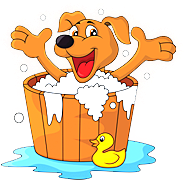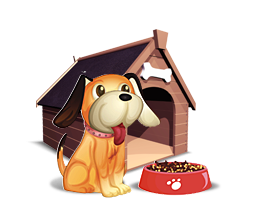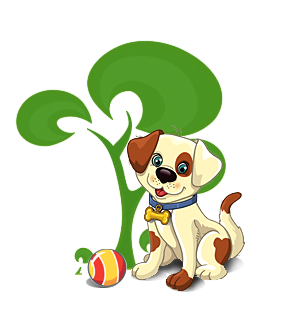|
The Main Tasks
 Feeding - In general, dry dog food is more nutritious than moist dog food. Any time you get a new pet, however, check with your veterinarian for dietary recommendations. On a hot day, be vigilant about your dog's water supply. Fill your pet's bowl with cold tap water and freshen it often. Feeding - In general, dry dog food is more nutritious than moist dog food. Any time you get a new pet, however, check with your veterinarian for dietary recommendations. On a hot day, be vigilant about your dog's water supply. Fill your pet's bowl with cold tap water and freshen it often.
Bathing - Dogs can get messy, and they don't naturally keep themselves quite as clean as we'd like them to be as co-habitants in our homes. As the owner, proper grooming on bathing is your responsibility. But there is more to caring for your dog than simple bathing. You must also care for your dog's nails, teeth, eyes and ears.
Grooming and Exercise - Groom short-haired dogs once or twice a week with a grooming comb.
Tips to keep in mind
 Like humans, dogs need food, water and shelter to survive. Also like humans, dogs need physical care and nurturing in order to thrive. Here's how to help keep your dog healthy, happy and safe while meeting the basic needs of all dogs. Like humans, dogs need food, water and shelter to survive. Also like humans, dogs need physical care and nurturing in order to thrive. Here's how to help keep your dog healthy, happy and safe while meeting the basic needs of all dogs.
- A dog would need plenty of attention in order to make him closer to you. Or else, you will find abnormal behavioural changes in your dog.
- You should take up effective steps to save your dog from the attack of fleas. You may even consult a vet regarding how to get rid of fleas and heart worms. He might turn up with effective flea control suggestions. You are advised not to make use of flea collars as they can be dangerous for the health of your dog.
- Make yourself updated with all the vaccinations that are necessary for your dog. Visit the veterinary clinic for routine checkup of your dog.
- Make yourself updated with all the vaccinations that are necessary for your dog. Visit the veterinary clinic for routine checkup of your dog.
- Give your dog to eat food items that are made up of pure ingredients. Choose the right dog food item that would have a balanced combination of nutrients like vitamins, protein, minerals and right amounts of calories. Some of dog’s food packets have excess of nutrients and calories that cause harm to the health of the dog.
- The amount of nutrition to be taken by a dog depends on the age, the breed and the level of activities carried out by your dog. So, be very particular about the nutritious diet that you should be giving to your dog.
- Dogs are more susceptible to heat than you are. So, especially during the summer season provide your dog with a cool resting place and do not force your dog to run or walk with you or to perform exercises in case your dog is not willing to do so.
- Give them plenty of water to drink. If you find your dog to be feeling restless due to heat do not hesitate to contact a veterinary doctor as a heatstroke for dogs can be life threatening for them.
Is your street dog ok ?
 Make sure dog stays healthy. Dogs feel pain, just as we do. There are very simple ways to know - such as any change in the way a dog behaves can be an early sign that it is ill, or in pain. Dogs which are ill, or in pain, often change their eating and drinking habits. They may eat less or stop eating and lose weight. They may drink excessive water drink less or not at all. They may get withdrawn. Some may stop playing. Others may cry when approached or touched, they may show unnecessary aggressiveness when approached. They may also show specific signs of ill health such as discharges from the eyes, ears or nose, excessive salivation, vomiting, diarrhoea or constipation, difficulties with passing urine, coughing, and they may scratch excessively and develop skin sores. Limping and swellings are also signs of possible ill health. Dogs are vulnerable to a range of infectious diseases and other illnesses. They need protection from serious infections, which can be provided by vaccination. Make sure dog stays healthy. Dogs feel pain, just as we do. There are very simple ways to know - such as any change in the way a dog behaves can be an early sign that it is ill, or in pain. Dogs which are ill, or in pain, often change their eating and drinking habits. They may eat less or stop eating and lose weight. They may drink excessive water drink less or not at all. They may get withdrawn. Some may stop playing. Others may cry when approached or touched, they may show unnecessary aggressiveness when approached. They may also show specific signs of ill health such as discharges from the eyes, ears or nose, excessive salivation, vomiting, diarrhoea or constipation, difficulties with passing urine, coughing, and they may scratch excessively and develop skin sores. Limping and swellings are also signs of possible ill health. Dogs are vulnerable to a range of infectious diseases and other illnesses. They need protection from serious infections, which can be provided by vaccination.
|